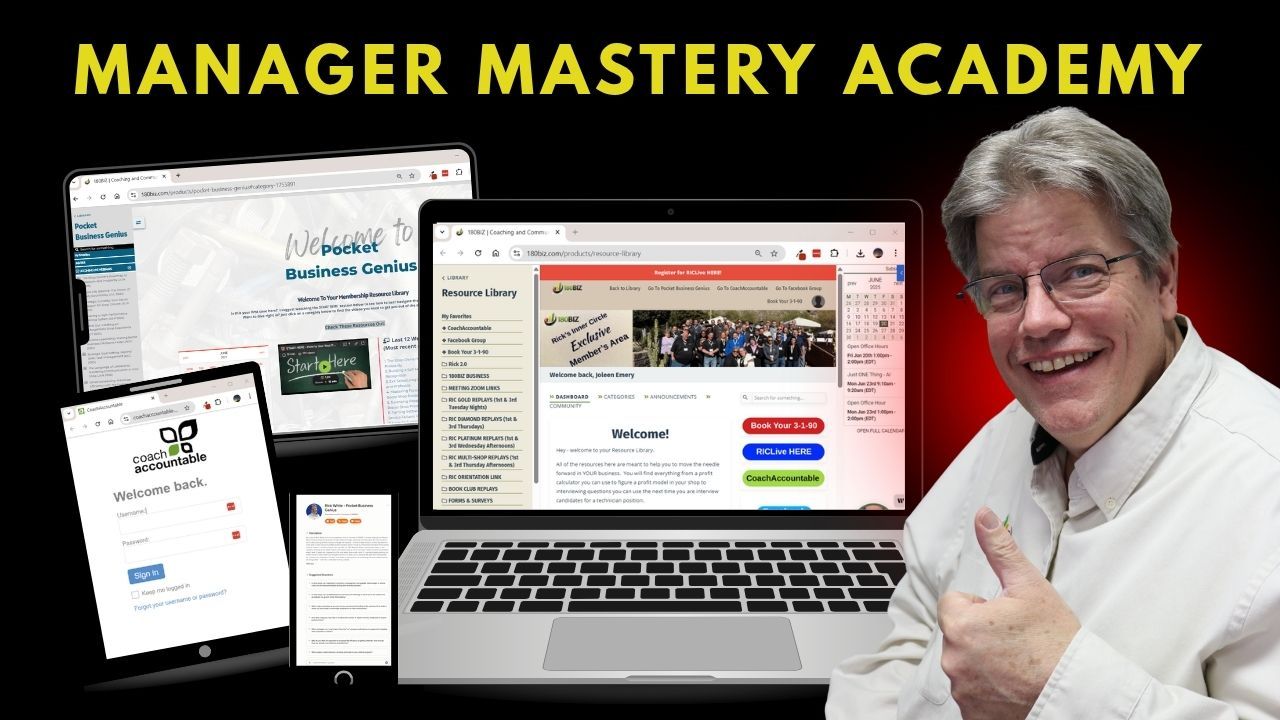The Right Way to Fail: How Smart Shop Owners Turn Setbacks Into Strength
Failure happens in every auto repair shop — a comeback that didn’t land, a tech who made a costly mistake, a project that went sideways. But failure itself isn’t the problem.
As Rick White of 180BIZ teaches, the real difference between shop owners who grow and those who stay stuck is how they handle failure.
Most people think failure is final. In truth, it’s feedback. And when you learn to treat it that way, it becomes one of the most valuable business tools you have.
Failure Is Either an Event or an Emotion
Every failure falls into one of two categories: event or emotion.
An event is measurable — it’s something that happened. You can study it, learn from it, adjust, and move forward. It becomes a data point in your progress.
An emotion, though, is different. That’s when failure becomes personal. You internalize it. You make it part of your identity. “I failed” turns into “I am a failure.”
One version teaches you. The other traps you.
Treat Failure Like Data, Not Drama
When you treat failure as data, you start asking better questions.
- What worked?
- What didn’t?
- What can I change next time?
This is the science of failing successfully. Each misstep is just one attempt that didn’t produce the desired result — nothing more, nothing less.
That mindset builds resilience, which is how fast you recover after falling. The faster you get back up, the stronger your leadership becomes.
The Real Cause of Pain: Unrealistic Expectations
Most of the pain tied to failure doesn’t come from what happened — it comes from the expectations surrounding it.
When you expect perfection the first time you try something new, you’re setting yourself up for frustration. That’s not confidence. That’s delusion.
No one nails it the first time, and pretending otherwise leads to self-blame and what can feel like a downward spiral. Instead of learning, you start avoiding anything that might go wrong again.
The solution is simple: separate your self-worth from your results.
Failure doesn’t define you. It just describes what happened.
Event. Emotion. Elevate.
Here’s a simple framework to apply the next time something doesn’t go as planned:
Event — Something happened that didn’t match your expectations. Accept it.
Emotion — Feel the disappointment. Don’t avoid or suppress it.
Elevate — Learn from it, adjust, and move forward stronger.
When you give yourself permission to feel without feeding the emotion, failure loses its grip. You can look at it clearly, extract the lesson, and pivot.
That’s how progress is made — not by avoiding failure, but by elevating beyond it.
Failing Well Means You Feel It, But You Don’t Feed It
You can’t grow without failing. The goal isn’t to eliminate failure — it’s to fail well.
Failing well means you allow yourself to feel it, but you don’t keep replaying it in your head. You don’t feed it until it becomes part of your identity.
The fastest way to move forward is to detach your self-worth from the situation. Failure is an event, not a label. Learn from it, adjust, and get back up.
That’s what separates the shop owners who build unstoppable teams from the ones who get stuck in self-doubt.
Your Turn: Rethink Your Last Failure
Think about your most recent setback. Was it an event or an emotion?
If it was an event, good — that means you’re learning.
If it felt emotional, take a step back and look at it again through the lens of data. What can it teach you? What needs to change?
Detach. Learn. Adjust. Move forward.
That’s how strong shop owners lead — not by avoiding failure, but by mastering it.
Every setback is a setup for growth. Fail smarter, learn faster, and watch your shop thrive.
Want to learn more about transforming your business?
Join my mailing list to get advice you can use to improve your shop, the day it lands in your inbox.
Don't worry, your information will not be shared.
We hate SPAM. We will never sell your information, for any reason.


